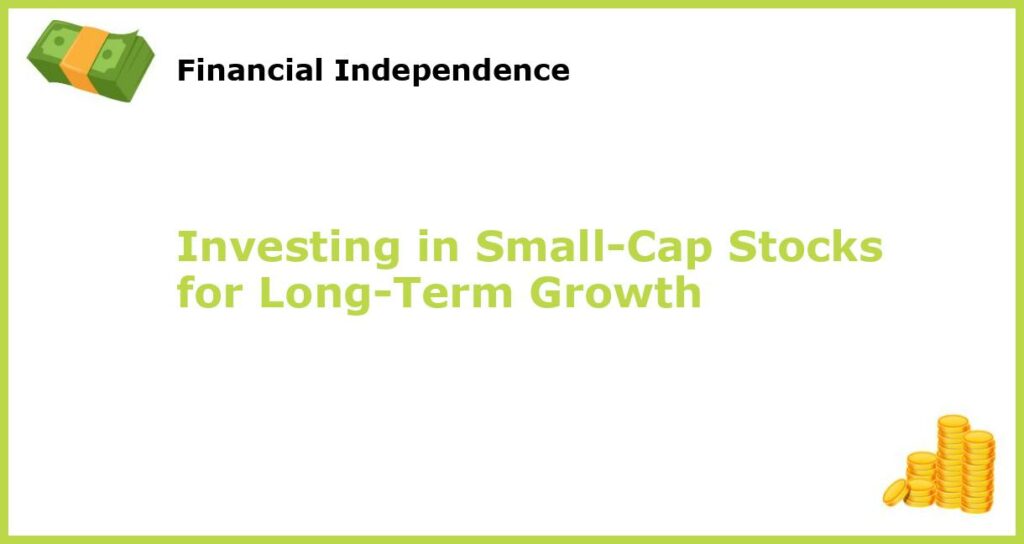Small-cap companies are like the underdogs in the investing world. They may not have the size and prestige of large-cap companies, but they have a lot of potential. Despite the potential, many investors overlook small-cap companies because they carry a higher risk. However, the demand for small-cap stocks is increasing as investors search for new ways to generate higher returns on their investments.
The Appeal of Small-Cap Stocks

Smaller companies have a lot of room to grow and can offer higher potential returns. They typically lack the attention of Wall Street analysts, which can often result in undervalued stocks. Small-cap stocks, by their nature, are domestically-focused, which is an advantage given the current global economic climate. They are often more insulated from global economic turmoil than their large-cap counterparts.
Small-cap stocks are perceived as riskier, and rightly so. Investing in untested small-cap companies can be a double-edged sword. While they have the potential to deliver substantial returns, they can also result in significant losses. Some small-cap companies lack a good track record of success, and their management team may lack the expertise required to take the company to the next level. As such, investing in small-caps is best suited to investors with a higher risk tolerance.
Risk Mitigation Strategies

To mitigate the risk of investing in small-cap stocks, the primary strategy is diversification. It’s critical not to put all your eggs in one basket. Invest in a range of small-cap stocks, which can help to spread out the risk over multiple companies. This way, if some stocks fail, you can still generate a positive return. Another important factor is doing proper due diligence on the small-cap companies you invest in. Scrutinize their financial statements, management team, and industry trends to gain more knowledge and make sound investment decisions.
Investing in small-cap stocks requires patience. The companies take time to grow and develop, and it can take years to see any substantial returns. As an investor, it’s essential to invest your money with a long-term perspective. Give your small-cap investments time to reach their potential, and don’t let emotions cloud your investment decisions. If a small-cap stock underperforms for an extended period, it may be time to cut your losses.
Demand for Small Caps in the Market

As interest rates remain low amid the current economic climate, investors are turning to small-cap companies in search of higher returns. The demand for small-cap stocks is also due to institutional investors, such as pension funds and endowments, that are looking for new sources of growth. The increasing demand for small-cap stocks indicates that investors are recognizing the potential for higher returns while taking on more risk.
Limitations of Large-Cap Stocks
Investing only in large-cap stocks may limit your growth potential and result in less return on investment. Large-cap companies are already established and may have reached their peak in terms of growth. As such, investing solely in large-cap stocks may not give you the return you are after. Wall Street analysts predominantly cover large-cap companies, which limits the upside potential for investment growth.
The Role of Dividends
While small-cap companies may not offer dividends initially, dividend-paying small-cap companies are a sign of stability and financial strength as they grow. Dividends provide investors with a regular income stream, and reinvesting dividends can help to compound returns over time. Therefore, investing in small-cap companies that offer dividends could be a wise investment move in the long term.
The Advantages of Flexibility
Small-cap companies are typically more nimble than larger companies, and as such, they can adapt faster to new industry trends and opportunities. Smaller companies are not burdened by bureaucratic decision-making processes and hierarchical structures, allowing them to make quick and responsive strategic decisions. This flexibility can result in a competitive advantage over larger, slower-moving companies.
Targeting Undervalued Stocks
Small-cap stocks can often be overlooked by Wall Street analysts, resulting in undervaluation. This undervaluation creates a buying opportunity for savvy investors. By identifying small-cap stocks with potential that are undervalued by the market, you can invest in a company before it gains wider recognition and share prices rise, resulting in substantial returns.
The Importance of Research
Doing thorough research is crucial when investing in small-cap stocks. Research helps identify companies with potential, manage risk, and adapt to market conditions. A fundamental analysis of the industry landscape, a thorough review of the company’s financial statements, and its management team are all critical components of a sound investment plan. With proper research, you can make informed investment decisions and build a diversified portfolio.
Overall, small-cap stocks have a lot of potential for the discerning investor. While they may carry higher risks, they can offer higher potential returns in the long term. Successful investing in small-cap companies requires patience, diversification, research, and a good understanding of the market conditions. By following these principles, an investor can reap substantial rewards from investing in small-cap companies.







